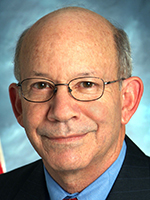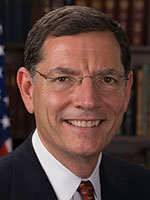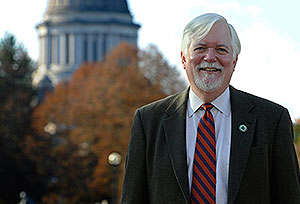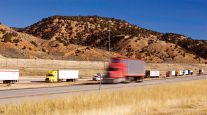Senior Reporter
Partisan Disagreements Persist Over Infrastructure Funding Mechanism

WASHINGTON — The leaders of the congressional committees tasked with crafting an infrastructure policy bill continue to disagree over a sustainable approach for ensuring the country’s transportation network is funded long term.
While Republicans express support for a vehicle-miles-traveled fee and other alternatives, Democrats on the transportation panels champion the first fuel tax increase since the Clinton administration.
The partisan rift threatens efforts to advance an infrastructure measure, which House leaders want to take up before August.

DeFazio
House multimodal transportation committee Chairman Peter DeFazio (D-Ore.) reminded colleagues of the need for advancing a comprehensive package that would be backed primarily by federal funds rather than private sector investments. On March 13, the chairman emphasized groups such as the U.S. Chamber of Commerce support higher fuel taxes so that revenue can be used for the Highway Trust Fund.
“There is near unanimous support among stakeholders for finding real revenues,” DeFazio said. “It is time for this clear willingness to translate into action by Congress to do the right thing and raise real revenues.”
DeFazio has suggested his committee could consider a comprehensive infrastructure bill this summer, and a highway reauthorization measure next year. The 2015 highway law expires in September 2020.
DeFazio’s Democratic counterpart in the Senate, Environment and Public Works ranking member Tom Carper, explained a fuel tax increase is an idea “whose time may have come” and its adoption would give policymakers more years to review the merits of a nationwide vehicle-miles-traveled program. Eventually, he added, a full transition toward a VMT fee would be possible.
Ultimately, Carper (D-Del.) added, a presidential endorsement would help propel an infrastructure package across the finish line.
“I think [Trump] realizes that he has a responsibility to lead on this and especially to lead on the politically difficult matter of how we’re going to pay for major improvements in our transportation system,” Carper told reporters March 13. “I think if he does that, he’ll find the Democrats, Republicans will support restoring the purchasing power of the gas and diesel tax.”

Barrasso
Meanwhile, EPW Chairman John Barrasso (R-Wyo.) said the panel is working on an “aggressive schedule,” and would not rule out a specific funding approach for the legislation. Regarding increasing fuel taxes, he added: “I’m not a fan.”
Speaking to reporters March 11, Transportation Secretary Elaine Chao shared Barrasso’s sentiment of an openness for considering various funding approaches.
“We’re going to be looking at things, I think, from a new point of view,” Chao said. “We learned from last year’s proposal. We had hoped that there’d be a greater acceptance of the private sector coming in to help finance public infrastructure.”
Considering a singular comprehensive package this year could be easier to advance than taking up two bills, the secretary added.
Last year, Congress ignored a 10-year, $1.5 trillion White House infrastructure proposal that relied significantly on private investors.
In his fiscal 2020 budget request to Congress, Trump proposed $200 billion meant to assist lawmakers with producing a $1 trillion infrastructure package. Office of Management and Budget acting director Russ Vought said the administration aims to ensure the legislation is not exclusively about surface transportation, adding, “when we need money for broadband or other infrastructure, that is also something that we can pursue.”

Washington state DOT Secretary Roger Millar. (Washington State Department of Transportation)
Stakeholders, meanwhile, continue to sound the alarm on the growing congestion.
“Preserving our transportation system in a state of good repair and managing the capacity of that system effectively are essential to moving products to market,” Roger Millar, secretary of the Washington state Department of Transportation, told a House transportation subcommittee March 13. “In the next decade, with current funding levels, we are likely to see bridges closed, speed limits reduced,and routes not adequately preserved, significantly impacting the ability of businesses to compete globally.”
Stakeholders and policymakers agree a budget debate with the White House in the fall and 2020 presidential politics will likely eclipse the congressional legislative calendar after the August break.
The Highway Trust Fund is projected to approach insolvency in about two years. Revenue from the 24.4 cents per gallon diesel tax and 18.4 cents per gallon gas tax is insufficient to meet the account’s obligations. Those taxes were last raised in 1993.


